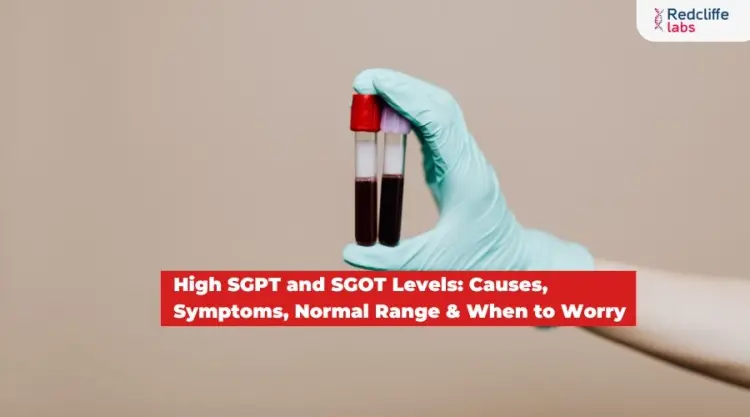Blood
Unlock special
discount on
this package
Login to Unlock 🔓
NABL Accredited lab*

Booking Benefits Unlocked Worth FREE 799

Report Consultation

Diet Plan
*Available once your report is generated.
At Redcliffe Labs, we have a single goal: to give India its right to quality diagnostics.
Customers served
Tests Processed Everyday
Cities
Collection Centres
World Class In-house Labs
Home Collection Experts
1 Test Parameters
Immunoglobulin A (IgA)
1 PARAMETER INCLUDED
1 PARAMETER INCLUDED
- Immunoglobulin A (IgA)
Top Booked Health Checkup Packages
Reports in 12 hours
|Parameters 94
Reports in 12 hours
|Parameters 89
Reports in 12 hours
|Parameters 96
Reports in 12 hours
|Parameters 96
Reports in 12 hours
|Parameters 90
Verified by Medical Expert

WRITTEN BY
Sheena Mehta

MEDICALLY REVIEWED BY
Dr. Pradeep Lodha
Table of Content
Introduction to Immunoglobulin A (IgA) Test
Your body consists of antibodies and proteins in the blood that help the immune system find infections, germs, and diseases. These antibodies, also called immunoglobulins, are the proteins in your body. A doctor may recommend the IgA test to detect the level of immunoglobulin A. Irregular immunoglobulin shows an abnormality in respiratory and gastrointestinal function.
If you see any signs or your doctor recommends taking the test, get it from Redcliffe Labs. Redcliffe Labs offers over 3600 tests. The immunoglobulin A (IgA) test detects a deficiency of immunoglobulins that causes diseases like lupus and arthritis—such as IgG, IgA, and IgM. We offer a home sample collection service, making it affordable and convenient for every Indian.
Test Details in Brief
| Also known as | Quantitative immunoglobulins, total immunoglobulins, IgG, IgM, IgA testing |
| Purpose | To measure the levels of the immunoglobulin in the blood. |
| Preparation | Don’t take too much stress. |
| Fasting | The test needs no fasting. |
| Get reports within | 15 hours |
| Cost | INR 390 |
What Are The Types of Immunoglobulin?
Your body produces different types of immunoglobulin antibodies. These are immunoglobulin A, immunoglobulin G, immunoglobulin M, and immunoglobulin E.
- Immunoglobulin A: These antibodies exist in the mucus of the lungs, stomach, intestines, and sinuses. They are also present in saliva, tears, and blood.
- Immunoglobulin G: These antibodies protect your body against infections and germs. IgG’s presence helps doctors figure out what infection your body has.
- Immunoglobulin M: These are the initial antibodies produced when infected by germs or bacteria.
- Immunoglobulin E: These antibodies fight against any harmful substance when attacked. Your doctor might suggest taking the IgE test to check for any allergies.
What Does The IgA Test Measure?
The IgA test measures the immunoglobulin A level in the blood. Antibodies are the proteins present in the body that fight against infection and disease. The test can also measure:
- The power of immune cells to fight bacteria, viruses, and other infections.
- Any underlying problem with the immune system.
- Low or high immunoglobulins.
- Any infection in the blood.
- Any allergies or an overactive immune system.
What Does The IgA Test Use For?
The Immunoglobulin A (IgA) test is a blood test for various purposes. These are,
- Checking your immunity system health.
- Diagnose various health conditions that can cause abnormal levels of antibodies.
- Diagnose autoimmune disorder.
- Detect certain types of cancers
- Monitor chronic-infection
- Diagnose by birth genetic diseases
- Monitoring certain infections such as syphilis or toxoplasmosis.
Why Can A Doctor Suggest The IgA Blood Test?
A doctor may suggest the IgA blood test:
- To diagnose infection in the immune system, kidneys, and intestines.
- In kids who face recurrent infections
- To check the condition of autoimmune conditions (celiac diseases, lupus, and arthritis)
- In kids who are born with low IgA
- To people who are at high risk of
- Autoimmune conditions
- Infections
- Asthma
- Allergies
- Throat, ear infection, and sinus
- Respiratory infection
- Severe infection such as a yeast infection or cytomegalovirus
Other reasons your doctor might recommend the IgA test are:
- Immunodeficiency in family
- A problem in producing low levels of immunoglobulins A.
- Autoimmune diseases
- Certain cancers that might affect the immune system or bone marrow
- High immunoglobulin
Signs and Symptoms Showing The Need For IgA Blood Test
Several signs and symptoms indicate the need for the IgA blood test. These signs include:
- Diarrhea
- Unnecessary weight loss
- Fever
- Recurring infection
- Allergies
- Skin rashes
- HIV or AIDS
- Multiple myeloma
- Sickness because of traveling
- Infection in the
- Sinuses
- Lungs
- Stomach
- Intestines
- Any other infection to monitor
Preparation For The Immunoglobulin A (IgA) Test
Immunoglobulin A (IgA) test preparation is typically simple. However, there are a few things to remember to guarantee accurate results:
- Observe the Advice Given by Your Healthcare Professional: Your doctor might have particular instructions based on the purpose of the test or your medical history. Always heed their advice.
- Fasting: You can take the IgA test without fasting, but follow your doctor's advice if they recommend it or if you have additional tests that call for fasting.
- Supplements and Medication: Tell your doctor about supplements and medications you take. Certain substances could impact test findings.
- Avoid Alcohol and Smoking: Since these can occasionally impact laboratory results, it's a good idea to abstain from alcohol and tobacco use before the test.
- Hydration: Before your exam, sip a lot of water. Proper hydration can make it easier for the medical practitioner to take your blood.
- Timing: Be sure to work with your healthcare physician to arrange a time that works for any concurrent testing you may be undergoing.
- Make an effort to keep calm and at ease before the test. Stress can sometimes affect your body's processes, but IgA levels are unaffected.
Talk to your healthcare practitioner about any particular ailments or worries you may have for personalized guidance.
Procedure For The IgA Test
Redcliffe Labs provides a convenient home blood sample collection option for your Immunoglobulin A (IgA) test. This is how the procedure operates:
- Make an Appointment:
Make an appointment for an IgA test home visit by contacting Redcliffe Labs. You can contact their customer care department by phone or online.
- Visit by our Phlebotomist:
A skilled phlebotomist from Redcliffe Labs will take a blood sample to your house on the appointed day. The phlebotomist will arrive at the scheduled time and be equipped with everything needed to guarantee a safe and sterile process.
- Sample Gathering:
The phlebotomist will clean the blood draw site, usually from an arm vein, and then take a sample of your blood with a needle into sterile vials. This brief procedure typically takes a few minutes. The phlebotomist is happy to help if you need specific accommodations or concerns.
- Following Collection:
Following sample collection, the phlebotomist will wrap the affected region appropriately and, if necessary, provide aftercare instructions. You can return to your regular activities immediately after the appointment.
- Laboratory Analysis:
Redcliffe Labs will securely receive the obtained sample for examination. The IgA test aims to determine your blood's immunoglobulin A level.
Getting the Outcomes:
Within 15 hours, test results will be accessible. Redcliffe Labs will tell you via message, and your healthcare physician will discuss the findings with you.
Go to the Redcliffe Labs website or contact their customer support representatives for further information or to arrange to collect your home blood sample.
Risks Associated with The IgA Test
The IgA blood test is simple. Redcliffe Labs’s phlebotomists conduct a smooth test procedure. However, they insert a sterile syringe so that you might feel:
- Slight pain
- Bleeding
- Weakness
- Vomit or nausea
- Hematoma
- Dehydration
- Bruises
What Do The IgA Test Results Mean?
The test helps your doctor analyze the IgG, IgA, and IgM antibody levels. Each level may be interpreted differently. Any abnormality may indicate low or high immunoglobulin. If your results aren’t normal, you may need other tests to determine what affects your immune system.
High Level of immunoglobulin may cause:
- Autoimmune diseases
- Cirrhosis
- Hepatitis
- Certain cancers
- Multiple myeloma
- Chronic lymphocytic leukemia
- Waldenstrom macroglobulinemia
- Lymphoma
| High Level | Causes |
High levels of polyclonal in all three antibodies, i.e., IgG, IgA, IgM |
Infection during pregnancy in an infant |
| Chronic inflammation | |
| Cirrhosis | |
| Hyperimmunization reactions | |
| Wiskott-Aldrish syndrome | |
| Acute or chronic infection | |
| Autoimmune disorder | |
| CMV, rubella, syphilis, toxoplasmosis | |
High levels of monoclonal in one antibody with or without other antibodies |
Chronic lymphocytic leukemia |
| Lymphoma | |
| Waldernstorn’s macroglobulinemia | |
| Multiple myeloma | |
| Monoclonal gammopathy of undetermined significance (MGUS) |
Low levels of immunoglobulin may cause:
- Kidney disease
- Serious burns
- Malabsorption disorder
- Malnutrition
- Complications with diabetes
- Kidney failure
- Common variable immunodeficiency disorder (CVD)
| Low Levels | Causes |
| Abnormal immunoglobulin production | Kidney failure or diabetes |
| Delay in the production of newborns | |
| Drugs such as immunosuppressant drugs | |
| Abnormal loss of protein | Burns |
| Protein-losing enteropathy | |
| Nephrotic syndrome (kidney disease) |
What Else Should You Know About The IgA Test?
Low immunoglobulin-producing conditions frequently result in a weakened immune response in immunization recipients. They might not receive live vaccinations, including those for measles or polio, and they might not build enough antibodies to provide protection.
Numerous laboratory tests evaluate blood antibody levels; however, individuals with immunoglobulin deficits may experience false-negative test results. For example, an examination for celiac disease quantifies the IgA class of antibodies against tissue transglutaminase (anti-tTG). Even if a person has celiac disease, this test may be negative if they have an IgA deficit. The medical professional may perform a quantitative IgA test to confirm the diagnosis.
If a deficiency in a particular subclass is suspected or IgG or IgA levels are low, we may conduct further subclass testing to determine and describe the deficiency. Even when the total concentration of a certain immunoglobulin class, like IgG, seems normal, subclass deficits might nevertheless develop.
Anti-IgA antibodies can also develop in certain people with IgA deficiency. These people risk suffering a life-threatening allergic reaction if they receive blood transfusions containing IgA (such as plasma or immunoglobulin therapies).
Cost Of IgA Test at Redcliffe Labs!
Redcliffe Labs is your best bet for dependable and reasonably priced diagnostic services. The IgA test price is just INR 390. At just INR 390, our Immunoglobulin A (IgA) test offers great value without sacrificing quality. We have more than 3600 tests. You may count on us for all your diagnostic needs because of our reliable experience and dedication to precise outcomes. For excellent care, dependability, and affordability, choose Redcliffe Labs.

Immunoglobulin A (IgA) Test Cost in Different Cities - Redcliffe Labs
| City Name | Discounted Price |
| Delhi | ₹390 |
| Ahmedabad | ₹390 |
| Mumbai | ₹390 |
| Bangalore | ₹499 |
| Noida | ₹390 |
| Pune | ₹390 |
| Lucknow | ₹390 |
| Hyderabad | ₹390 |
| Chennai | ₹390 |
| Gurgaon | ₹390 |
| Jaipur | ₹390 |
| Faridabad | ₹390 |
| Indore | ₹390 |
| Patna | ₹390 |
Note: We also offer Immunoglobulin A (IgA) Test PAN India. Please call the number 8988988787 to check the availability of our services in your area.
Take Care of Your Immune System With Redcliffe Labs!
Redcliffe Labs offers excellent value and convenience for your Immunoglobulin A (IgA) test. Our test ensures precise results without breaking the bank by combining cost with superior diagnostics. Using Six Sigma (a groundbreaking technology) and our dependable experience, you get 100% report correctness outcomes from qualified experts.
Take advantage of the extra convenience of our home blood sample collection service, where our expert phlebotomists come to you, ensuring a stress-free and flawless experience. Redcliffe Labs offers affordability, dependability, and convenience by delivering fast and secure results straight to your door.
5 Simple Steps to Manage Your Health with Redcliffe Labs
Quick, Simple & Convenient; trusted care delivered to your doorstep.

Start Your Online Booking
Open the Redcliffe Labs website/app. Select the test or package and enter your details. Schedule the service for your preferred slot.

Live Tracking
Stay updated with real-time tracking for a smooth and timely home sample collection.

Sample Collection
Our certified experts ensure a smooth, hygienic, and fully compliant sample collection experience.

Doctor-Verified Smart Reports
Every report is clinically checked by expert doctors and shared with smart, actionable insights.

Your Health Journey Continues Post Reports
Consult with our expert medical team to get actionable insights to improve your health.
Nearby Labs(9)
Redcliffe Labs Noida

MC-5280
Redcliffe Collection Center
Redcliffe Collection Center
Redcliffe Collection Center
Redcliffe Collection Center
Redcliffe Collection Center
Redcliffe Collection Center
Redcliffe Collection Center
Redcliffe Collection Center
Frequently Asked Questions
What is an IgA test?
What is the Price of an IgA blood test?
Why is the IgA test important?
When is an IgA test recommended?
What are the normal IgA levels?
Can medications affect IgA levels?
Is any special preparation required for the IgA test?
How long does it take to get results from the IgA test?
Can I book a Immunoglobulin A (IgA) Test near me?
Can I book a home collection for a Immunoglobulin A (IgA) Test?
Health Articles & Blogs
My Health
Stay informed with our expert health articles and blogs. Explore comprehensive guides on diseases, nutrition, preventive care, and wellness tips to help you make better health decisions.
Why is PCOS Continuously Rising in Women?

10 Healthy Holi Recipes for Your Fitness Goals in 2026
Looking for healthy Holi recipes? Discover 10 festive dishes that support your fitness goals while keeping celebrations delicious.

Importance of Heart Health Before Pregnancy: Everything You Need to Know

Migraine Treatment at Home: Effective Ways to Relieve Migraines Naturally

High SGPT and SGOT Levels: Causes, Symptoms, Normal Range & When to Worry

Brain Hemorrhage Symptoms: Early Warning Signs, Types, Causes & When to Seek Emergency Care

What is SGPT in Blood Reports? Everything You Need to Know

Capsicum (Shimla Mirch) 101: Benefits, Nutritional Value, Uses and More
Explore My Health
